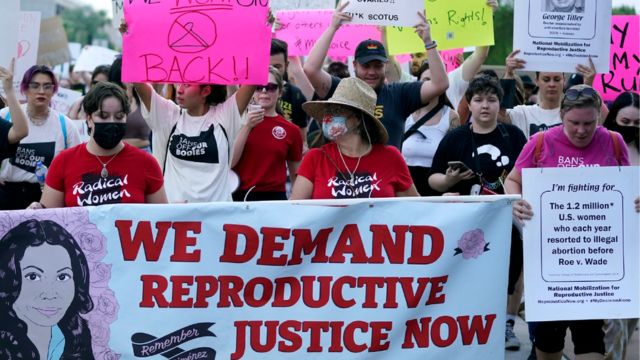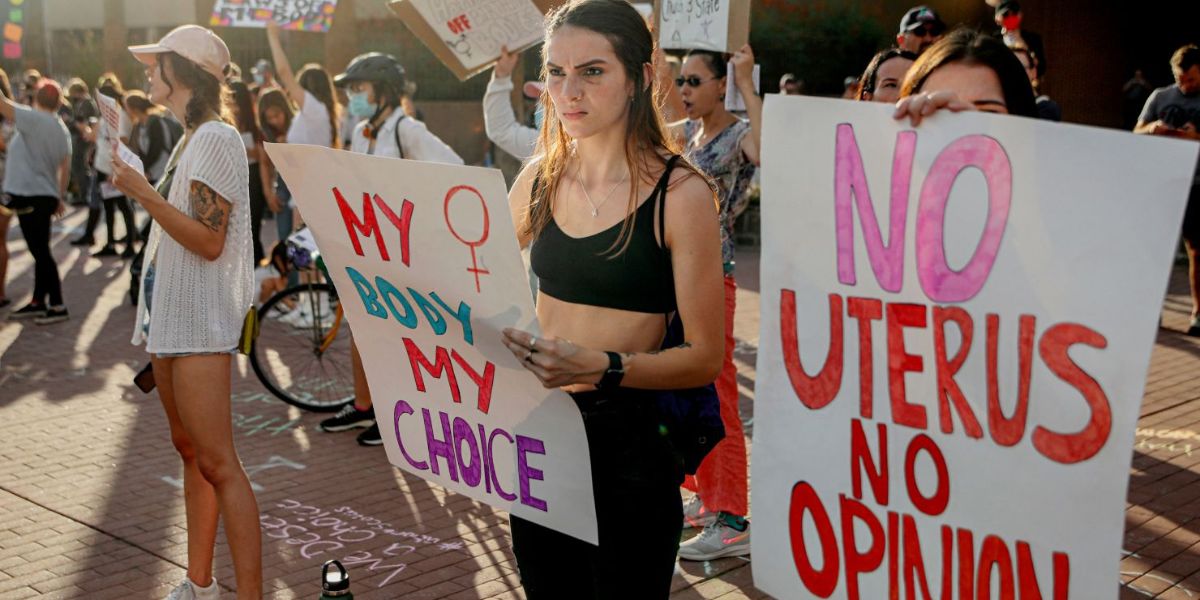Arizona Abortion Access Hangs in the Balance as Supreme Court Reviews Historic Ban
DEBARYLIFE – Tuesday morning will see the publication of the much-anticipated decision by the Arizona Supreme Court regarding the legality of almost all abortions done in the Grand Canyon State.
Oral arguments in an appeal filed by an anti-abortion physician seeking to restore a nearly complete ban from 1864, almost six decades before Arizona became a state, were heard by the high court in December.
The restriction forbade all abortions to save those performed to save the mother’s life. The lawsuit aims to overturn a lower court’s ruling that the 1864 statute shouldn’t supersede almost fifty years’ worth of new legislation and that a more recent, 15-week gestational prohibition, enacted in 2022, should be maintained in its place.
The Prelude
In a decision known as Dobbs v. Jackson Women’s Health Organization, the U.S. Supreme Court declared two years ago that the states no longer had the constitutional authority to regulate abortion. After that decision, women and physicians in Arizona faced months of legal limbo as the state’s authorities and the judiciary debated the appropriate limits on abortion rights.

The GOP-majority legislature in Arizona established a 15-week gestational restriction in anticipation of a favorable verdict, just months before the Supreme Court decided to gut the protections in Roe v. Wade. However, an injunction based on Roe preserved a more severe statute from Arizona’s time as a territory.
Clinic closures resulted from disagreements between the two legislations for several months. The 1864 law forbids all abortions except those performed to save a woman’s life. Still, the 2022 law permits elective abortions up to 15 weeks, with exceptions for irreversible harm or life-threatening situations beyond that time.
Furthermore, each has unique penalties: While doctors are subject to a required 2–5 year prison sentence under the 1864 statute, providers who break the 15-week restriction risk a class 6 felony and having their license revoked.
SEE MORE: Arizona Governor Katie Hobbs Strikes Down GOP’s ‘Great’ Gun Bill
After Roe was overturned, a trial court judge temporarily reinstated the 1864 ban, arguing that the Civil War-era statute should take precedence over other laws because the 15-week law contained a language saying it didn’t abolish any laws passed before its adoption.
Instead, the state appeal court upheld the 15-week gestational ban after Planned Parenthood Arizona, the largest abortion provider in the state, challenged that ruling. Arizona passed nearly fifty years of abortion regulations following the 1973 Roe v. Wade decision, but the judges of the appeals court determined that doing so would be incorrect.

The threat to access to abortion was mostly seen as unimportant when a group of pro-choice Democrats were elected to state offices by Arizonans in November 2022. Attorney General Kris Mayes of Arizona and Governor Katie Hobbs both promised not to prosecute doctors or women for getting or performing abortions.
However, Dr. Eric Hazelrigg’s anti-abortion Scottsdale law firm Alliance Defending Freedom filed an appeal, pleading with the Arizona Supreme Court to reinstate the Civil War-era statute. As a “guardian ad litem” for unborn children in Arizona, Hazelrigg—the medical director of a network of anti-abortion clinics throughout the Valley—was admitted into the case during the trial court phase.
The Disputes
During last year’s hearing, attorneys representing Hazelrigg informed the judges that the legislature in Arizona had made it obvious that abortion should be prohibited in almost all circumstances, and that the appeal court’s decision was incorrect.
Alliance Defending Freedom attorney Jake Warner stated that while the laws of 2022 and 1864 can be reconciled, the gestational restriction does not permit abortions in any fashion, as the appellate judges determined.
Rather, the 2022 law modifies the 1864 near-total ban by requiring an urgency to qualify for its exclusion for life-saving operations, which includes exceptions for women facing permanent harm or an “immediate” life-threatening scenario.
Warner claims that all abortions up to 15 weeks are illegal unless they are necessary to preserve the patient’s life, as required by the 1864 statute. After that, a woman must be in “immediate” danger to be eligible for an abortion under the 15-week ban’s exception clause.
SEE MORE: Florida Takes Action Now, Legislature Boosts Penalties for Community Association Fraud
Additionally, Warner contended that the 15-week law does not apply to all medical situations. For example, a cancer patient would no longer be able to get an abortion to start treatment; instead, they would have to wait until the pregnancy was finished.
Attorney Andy Gaona, representing Planned Parenthood Arizona, contended that the appeal court was right to maintain the 15-week prohibition over the 1864 legislation, thus preserving nearly 50 years of legislative experience.
Instead of only restricting the practice to 15 weeks, the legislature ought to have made it more apparent that it intended to criminalize all abortions if that was its true goal, he added.
A clause in the 15-week law that states it doesn’t repeal all laws that came before it gives the go-ahead for the Civil War-era law, according to supporters of the 1864 law, including Republican legislative leaders Ben Toma and Warren Petersen, who filed an amicus brief bolstering Hazelrigg’s appeal.
Gaona countered that it was insufficient. As evidence that Arizona lawmakers didn’t truly intend to outright forbid abortions, he cited the distinctions between the state’s legislation and the Mississippi statute that served as its model. Any abortion that complied with the 15-week prohibition but broke any other rule was ultimately illegal, according to a stipulation in the Mississippi law.
The otherwise similar version in Arizona was not amended to contain that provision by legislators.
The outcomes that could occur: The appeal court’s decision could be upheld by the Arizona Supreme Court, maintaining the current 15-week abortion limit in Arizona. However, if Hazelrigg is supported, Arizonan women would no longer be able to obtain abortions unless they are at risk of dying or suffering lasting, irreversible harm.
There would also be no way to dispute that decision. The only alternative left to reproductive rights advocates would be to start over and try to challenge the statute from a different legal viewpoint since they are now concentrating on persuading the judges to uphold the appellate court judgment.
Access to abortion services under the 15-week gestational limitation would persist for a brief period, even if upholding the 1864 statute would ultimately result in a nearly complete ban throughout the state.
This is because in 2022, the Arizona Medical Association and an abortion provider in Phoenix filed their own case against the 1864 statute, which was initially brought to court by then-Attorney General Mark Brnovich. Brnovich accepted a settlement that prevented Arizona from enforcing the 1864 statute until 45 days following the Arizona Supreme legal’s final decision, to avoid having to handle two legal issues at once.
A tie is a third choice. Only six of the seven justices on the Arizona Supreme Court are presiding over the case. Less than two weeks before oral arguments were scheduled, Justice Bill Montgomery abruptly resigned in response to public outcry after it was revealed that he had previously accused Planned Parenthood of organizing “the greatest genocide known to man” in articles published in the Arizona Mirror and The 19th.
The verdict of the appeal court will be upheld if the six justices are evenly divided in their opinion.
The broader background
Observing the long term, proponents of reproductive rights are banking on the November election to bring about long-lasting change as they wait for the court’s decision. On its way to the ballot is a constitutional amendment designed to safeguard abortion access under the Arizona Constitution from attacks by the GOP-controlled legislature or the courts.
Up until 24 weeks of pregnancy, abortion will be legal in Arizona if voters approve it. After that, a doctor may refuse to perform the procedure if it is thought to be necessary to preserve the patient’s life or physical or mental health.
Although the project is still in the signature-gathering phase, the campaign leading it made an announcement earlier this month stating that it had amassed 500,000 signatures, with a target of at least 750,000. To be eligible for the ballot, it must collect 383,923 valid voter signatures.
The revelation that the Supreme Court verdict is expected on Tuesday was welcomed with guarded hope by abortion providers who are waiting for word on whether they will be able to continue operating their clinics.
The Mirror was informed by Dr. Gabrielle Goodrick, the medical director of Camelback Family Planning, one of the state’s nine abortion facilities, that she anticipates receiving positive news. She said Arizona made the wrong decision in enacting the Civil War-era law.
“I hope that the court will not uphold an 1864 law that is ambiguous, unenforceable, and perplexing,” she texted.
The Supreme Court’s decision on an 1864 ban will determine access to abortion services in Arizona on Tuesday. This article originally appeared on Arizona Mirror.











